-
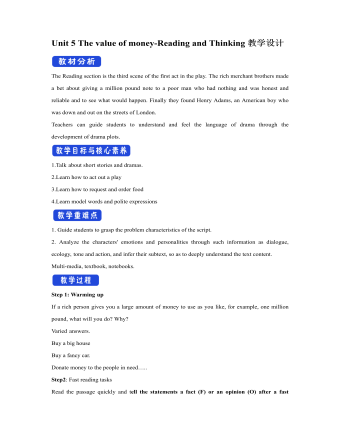
新人教版高中英语必修3Unit 5 The value of money-Reading and Thinking教学设计二
? Could you offer me some kind of work here?? I don’t want your charity, I just want an honest job.? Careless: I landed in Britain by accident.Step 7:Consolidation.? Find Henry? Roderick and Oliver were I .making a bet when they saw Henry, a poor young man. ? Know Henry? About a month ago, Henry was sailing and later he found himself carried out to sea by a strong wind. Fortunately, he 2.was spotted by a ship. And it was the ship that brought him to 3.England? Offer money to Henry ? Oliver and Roderick gave Henry a letter and told him that there was money in it. They 4.persuaded him to accept it, and made him 5.promise that it wouldn't be opened until 2 o'clock.Step 8:Language pointsa large amount of: a large quantity of; a great deal ofe.g. They bought a large amount of furniture before they moved their new house.make a bet: make an arrangement to risk money, etc. on an event of which the result is doubtful.e.g. We made a bet on the result of the match.permit sb to do something: allow somebody to do somethinge.g. My mother doesn’t permit me to ride in the street after it rained.by accident: as a result of chancee.g. I only found it by accident.stare at: look at somebody or something with the eyes wide open in a fixed gaze( in astonishment, wonder, fear, etc)to be honest: to tell you the truth; to be franke.g. To be honest, I don’t think we have a chance of winning.Step7 Homework:What do you think will happen to Henry? Will the bank-note help him or get him into trouble?
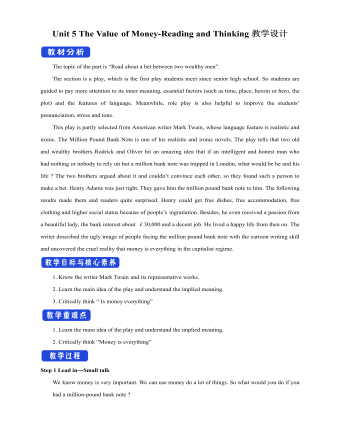
新人教版高中英语必修3Unit 5 The Value of Money-Reading and Thinking教学设计一
Everybody wants to get wealth.In today’s material world,making money or becoming wealthy symbolizes a person’s success and capability. Many people just make every effort, pay any price to attain greater wealth. With money,they can buy nice, large apartments in nice neighborhood. With money they can own luxurious cars. Wealth seems to bring all happiness in life.But is wealth the only road to happiness? Not really. There are many things in the world, which are beyond the means of money, such as friendship, love, health and knowledge. People are so preoccupied with struggling for money that they have no time or would not take the time to form or maintain friendship. What happiness can they feel living as lonely miserable creatures without love or friends in the world even if they accumulate tremendous wealth?In my opinion, people can’t do anything without money, but money is not everything. What money will bring you depends on your personal belief and goal in life. If you are kind enough to help others, especially the poor, money is a good thing to you. With it, you can do much more for the benefit of people and your country, and it will add to your own happiness. If you want money just for your own needs, you’ll never be satisfied or happy. In a word,you should have money spent for more people. Only then can money be the source of your happiness.Step 8 Homework4 students in a group, one acts Roderick, one Oliver, one servant and the fourth one acts Henry Adams, then listen to the tape, pay more attention to the difference between American English and British English in pronunciation, stress, tone.
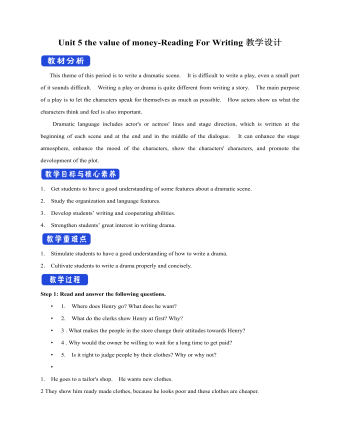
新人教版高中英语必修3Unit 5 the value of money-Reading For Writing教学设计一
【参考范文】Narrator:(Henry is smiling as he leaves the restaurant. As he is walking down the street, he sees a sign for a place that cuts hair. He decides to get it cut. )H=Henry;B=Barber;R=rude manH:Good afternoon, I'd like to get a cut, if I may. (The barber looks at Henry's hair and continues cutting another man's hair. )Er, I'd really like a haircut. As you can see it's much too long. B:(in a rude manner) Yes, I can see that. Indeed, I can. H:Fine, well I'll have a seat then. (He sits in one of the barber's chairs. The barber turns to look at Henry. )B:It's quite expensive here, you know!Are you sure you can afford it?H:Yes. I think so. (In comes the rude man. )R:Hey you there. I need a haircut quickly. Can you do me straightaway?B:All right, then, get in the chair and I'll see what I can do. R:Thank you. (sits down in one of the barber's chairs)H:Excuse me, but I was here first. Aren't you going to do my hair first?B:This man's in a hurry. H:Well so am I!I insist that you cut my hair first. B:OK, but I'll have to be quick. This gentleman is waiting. H:Thank you. (They both become quiet. After his hair is cut, the barber tells Henry how much he must pay. Henry shows the barber the bank note. )B:Why, Mr . . . (looks shocked)H:Adams. Henry Adams. I'm sorry, I don't have any change. R:You're that Mr Adams! Well,I'm glad I waited or I might never have known it was you. B:Why, Mr Adams, please don't worry!(wearing a big smile) Nothing to worry about!Nothing at all!Please come back any time, even if you only need too little hairs cut!It will be my honour to serve you!
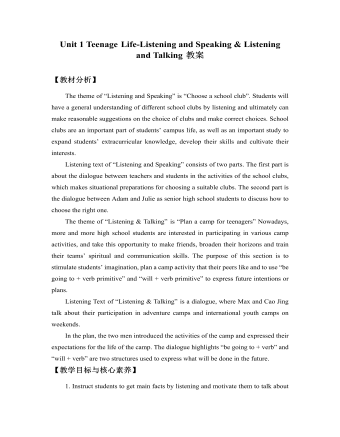
新人教版高中英语必修1Unit 1 Teenage Life-Listening and Speaking & Listening and Talking教案
Step 2 Listening and Talking1. The teacher is advised to talk with their new students about the related topic: Boys and girls, do you know some structures to talk about future activities? Talking about future activitiesWe’ll …I plan to …There’ll be …I hope to …We’re going to …2. After their small talk, the teacher can move on by playing the listening and solve the following task.Underline the expressions in the sentences below Cao Jing and Max use to talk about the future.We’ll learn useful skills.I plan to improve my spoken English.There’ll be students from different schools.I hope to make new friends.We’ll talk about teenage life.I’ll learn to make a fire.There’ll be students from different countries at the camp.There’ll be some experts there to show us how to live in the wild.We’re going to learn about wildlife.I’m going to give a speech.I think I’m going to enjoy the activities.I think we’ll have a lot of fun.3. Work in groups. Plan a youth camp.Teacher make the Ss think of ideas for the camp. And they can use the questions below to get started. And have the Ss present their ideas for a youth camp to the class.●What kind of camp is it?●Who will be there?●What will they do?●What will they learn?
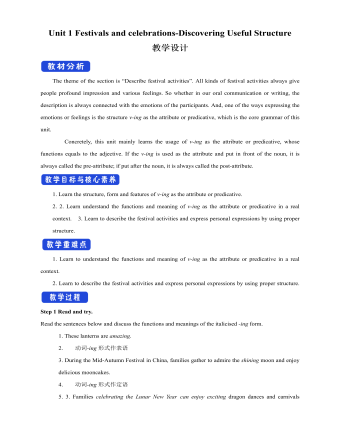
新人教版高中英语必修3Unit 1 Festivals and celebrations-Discovering Useful Structure教学设计
4.That was an experience that frightened everyone. →That was _____________________. 答案:1. taking 2. being discussed 3. in the reading room 4. a frightening experienceStep 6 The meaning and function of V-ing as the predicative动词-ing形式作表语,它通常位于系动词后面,用以说明主语“是什么”或“怎么样”一种表示主语的特质、特征和状态, 其作用相当于形容词; 另一种具体说明主语的内容, 即主语等同于表语, 两者可互换。The music they are playing sounds so exciting. 他们演奏的音乐听起来令人激动。The result is disappointing. 结果令人失望。Our job is playing all kinds of music. 我们的工作就是演奏各种音乐。Seeing is believing. 眼见为实。Step 7 Practice1. It is ________(amaze) that the boy is able to solve the problem so quickly.2. Buying a car is simply _______(waste) money. 3. Please stop making the noise—it’s getting ________(annoy). 4. complete the passage with the appropriate -ing form.La Tomatina is a festival that takes place in the Spanish town Bunol every August. I think many food festivals are __________ because people are just eating. however, this festival is _________ because people don't actually eat the tomatoes. Instead, they throw them at each other! the number of people ________ part in this tomato fight, can reach up to 20,000, and it is a very __________ fight that lasts for a whole hour. The _______ thing is how clean Bunol is after the tomatoes are washed away after the fight. this is because the juice form tomatoes is really good for making surfaces clean!答案:1. amazing 2. wasting 3. annoying4. boring interesting taking exciting amazing
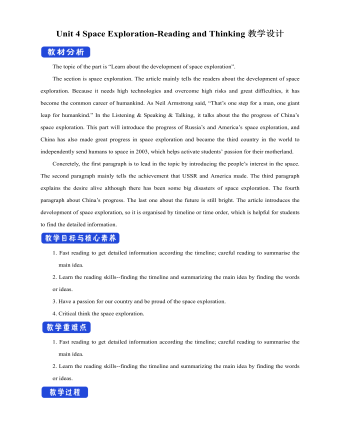
新人教版高中英语必修3Unit 4 Space Exploration-Reading and Thinking教学设计一
Q4: What is the function of the International exploration ?Having astronauts from different countries on boardQ5: What can you learn from Para 4 ?China has made great achievements in exploring spaceQ6: What is the attitude to the space exploration ?SupportiveStep 6 Post reading---RetellPeople have always wanted to learn more about space. Before the mid-20th century, most people felt (1)_________ (travel) into space was an impossible dream. However, (2)____ the help of scientists, peoplesucceeded in realizing their dream (3) _________ (explore) space. On 4 October 1957, the Sputnik 1 satellite (4) ____________(launch) by the USSR. (5) ________________ scientists try to make sure nothing goes wrong, accidents can still happen. These disasters made everyone(6)___________(disappoint), but people still believe in the importance of (7) ________(carry) on space exploration. In 2003, China became the third country to (8)_____________ (independent) send humans into space. Then Shenzhou 6 and 7 completed (9)____ second manned orbit and the first Chinese spacewalk. In spite of the difficulties, scientists hope future (10)__________ (discovery) will not only enable us to understand the universe but also help us survive well into the future.Answers: 1. travelling 2. with 3. to explore 4. was launched 5. Although6. disappointed 7. carrying 8. independently 9. a 10. discoveriesStep 6 Post reading---Critical thinkingQ1: What do you think of the space exploration ? I think it is beneficial to us. Through further study of space, people will make full use of it in the future, such as the space experiments by Wang Yaping in Tian Gong 1.Q2: If you are determined to be an astronaut, what should you prepare at present ?First of all, I should study hard to get a related college degree. Besides, I must keep mental and physical healthy.Step 7. HomeworkTry to summarize the structure of the article by a mind map.
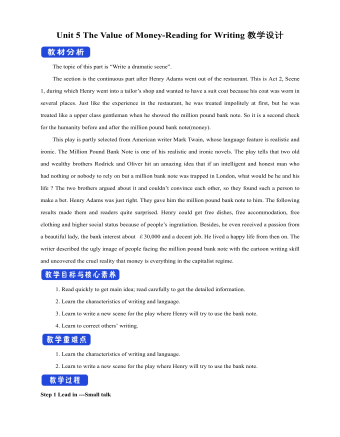
新人教版高中英语必修3Unit 5 The Value of Money-Reading for Writing教学设计二
2. 您能看到, 我头发太长了。You can see that my hair is much too long.3. 无论什么时候, 只要您想回来就回来。Please come back whenever you want.4. 您仅有很少的头发要理! You only have too little hair to cut !5. 为您服务是我的荣幸!It is my honour to serve you!Step 9 Writing(Henry is walking down the street when he sees a sign for a place that cuts hair. He decides to have it cut. )H=Henry B=BarberH: Good afternoon, I’d like to have my hair cut, if I may. (The barber looks at Henry’s hair and continues cutting another man’s hair. ) Er, I’d really like a haircut. As you can see it’s much too long. B: (in a rude manner) Yes, I can see that. Indeed, I can. H: Fine, well, I’ll have a seat then. (He sits in one of the barber’s chairs. The barber turns to look at Henry. )B: It’s quite expensive here, you know! Are you sure you can afford it?H: Yes. I think so. (After his hair is cut, the barber tells Henry how much he must pay. Henry shows the barber the bank note. )B: Why Mr. . . (looks shocked)H: Adams. Henry Adams. I’m sorry. I don’t have any change. B: Please don’t worry! (wearing a big smile) Nothing to worry about! Nothing at all! Please come back whenever you want, even if you only have too little hair to cut! It will be my honour to serve you!Step 10 Pair workExchange drafts with a partner. Use this checklist to help your partner revise his/her draft.1. Are all the elements of a play included and in good order ?2. Do the character use suitable language ?3. Are the stage directions clear and useful ?4. Is the plot clear and exciting enough ?
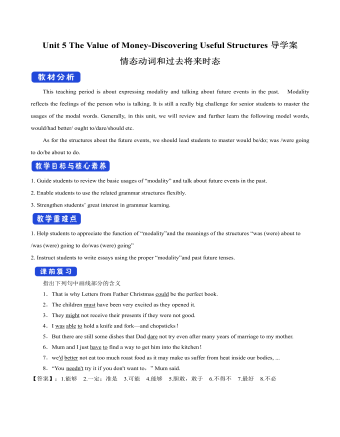
新人教版高中英语必修3Unit 5 The Value of Money-Discovering Useful Structures导学案
4.They were going to find someone to take part in their bet when they saw Henry walking on the street outside.[归纳]1.过去将来时的基本构成和用法过去将来时由“would+动词原形”构成,主要表示从过去某一时间来看将要发生的动作(尤其用于宾语从句中),还可以表示过去的动作习惯或倾向。Jeff knew he would be tired the next day.He promised that he would not open the letter until 2 o'clock.She said that she wouldn't do that again.2.表示过去将来时的其他表达法(1)was/were going to+动词原形:该结构有两个主要用法,一是表示过去的打算,二是表示在过去看来有迹象表明将要发生某事。I thought it was going to rain.(2)was/were to+动词原形:主要表示过去按计划或安排要做的事情。She said she was to get married next month.(3)was/were about to+动词原形:表示在过去看来即将要发生的动作,由于本身已含有“即将”的意味,所以不再与表示具体的将来时间状语连用。I was about to go to bed when the phone rang.(4)was/were+现在分词:表示在过去看来即将发生的动作,通常可用于该结构中的动词是come,go,leave,arrive,begin,start,stop,close,open,die,join,borrow,buy等瞬间动词。Jack said he was leaving tomorrow.
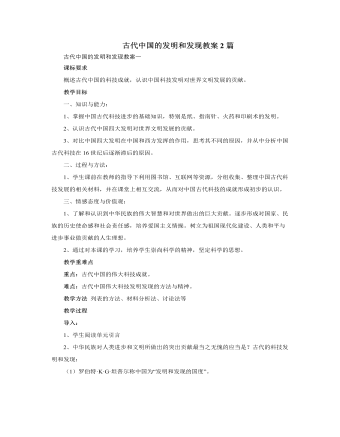
人教版高中历史必修3古代中国的发明和发现教案2篇
(2)由来:《黄帝内经》是我国古典医籍中现存最早的一部医学,在整个中医的发展过程起着重要的作用。该书中阐述的理论,一直以来指导着整个中医学术的发展,是学习中医不可缺少的一部经典读物,也是现代中医院学生学习中医时必读的医书。顾名思义,“内经”是讲内科方面的疾病,据《隋书.艺文志》记载,除了有《黄帝内经》外,还有一本《黄帝外经》。这两本书是姊妹篇。看来,《黄帝内经》是针对《黄帝外经》说的。2、《伤寒杂病论》:集大成的中医专著、“万世宝典”(1)作者:东汉张仲景(2)内容:全书分为“伤寒”和“杂病”两大部分,(3)地位:创造性地提出辩证施治的方法,奠定了后世中医临床学的理论基础,被后世医家誉为“万世宝典”。3、《本草纲目》:“东方药物巨典”(1)作者:明朝李时珍(2)内容:记录各类药物1892种、药方一万多个,还绘制了一千多幅药物形态图。(3)地位:这部重要的中药学著作,是对16世纪以前中药学的系统总结,被称为“东方药物宝典”。
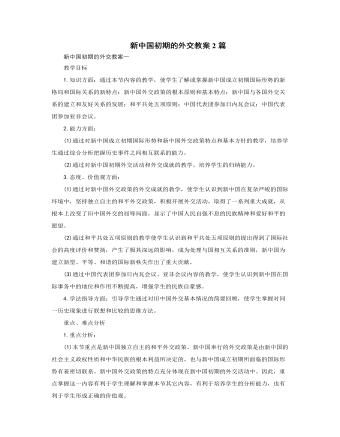
人教版高中历史必修1新中国初期的外交教案2篇
展示幻灯片17、19——21视频18,了解与中国建交的17个国家的概况,说明这是新中国成立后外交上取得的首次突破。 第一个和中国建交的非社会主义国家印度继承了英帝国主义在中国的特权,建国后中印双方多次就西藏问题进行谈判,正是在这一过程中周总理创造性地提出了和平共处五项原则。 成就2和平共处五项原则的提出 展示幻灯片22、23及视频24 探究:和平共处五项原则形成的过程是怎样的?内容是什么?有何意义? 结论(一)三个提出过程,强调重点是首次提出 (二)内容及其修订 (三)意义:标志着新中国外交的成熟;它为开创中国外交新局面奠定了基础;在世界上也产生深远的影响,成为解决国与国之间问题的基本准则。 展示幻灯片25、26 问题情境3:三、步入世界外交舞台
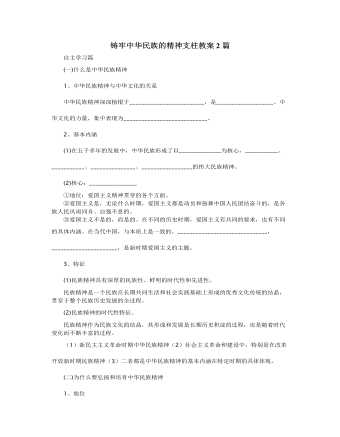
人教版高中政治必修3铸牢中华民族的精神支柱教案2篇
【教学重点】怎样弘扬和培育中华民族精神。【教学策略】(1)通过引导学生学习和探讨,使学生在解决实际问题的过程中了解弘扬和培育民族精神,最重要的是发挥“主心骨”的作用;必须继承和发扬中华民族的优良传统;必须正确对待外来思想文化的影响;必须与弘扬时代精神相结合。以爱国主义为核心的民族精神和以改革创新为核心的时代精神,相辅相成,相互支撑,统一于建设中国特色社会主义的伟大实践。(2)通过践行体验,结合美国传媒对世界的巨大影响以及不同国家强化民族精神教育的事例,引导学生体会和感悟民族精神对于一个国家、一个民族的生存和发展的重要性,理解我国当前弘扬和培育民族精神的重要意义;回顾历史经验教训,体会和思考我们应该弘扬和培育什么样的民族精神;面对世界范围各种思想文化相互激荡,体会和思考我们应如何弘扬和培育民族精神。【探究指导】可分三个步骤进行。
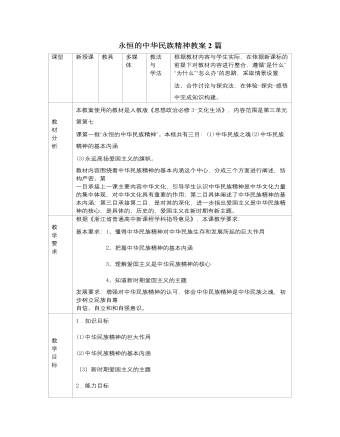
人教版高中政治必修3永恒的中华民族精神教案2篇
当你看到他们获得冠军登上金牌领奖台时,见到中华人民共和国国旗冉冉时升起时,听到中华人民共和国国歌奏响时,作为一名中国人,即使你对这两项运动都不感兴趣,你有什么样的感受?感觉到作为中国人的无比光荣与自豪 你呢 ? 你呢 ?你们都是一样,我和绝大多数中国人都有这种共同的感受。这是在和平年代,而在民族危亡时期,人们也有共同的行动 例如1900年八国联军进攻北京的途中遇到了民间组织的顽强抵抗,中国人民手持刀枪棍棒,同枪炮武装的侵略军展开斗争,血肉横飞,依然面无惧色,战到最后一人,也要奋勇拼杀。由以上两种情况,我们大家思考是什么使得他们有着共同的感受,有着共同的行动?提示:(若换作是大和民族的人他在刚才的情境中则不会有呢?)显而易见,我们是中华民族,有着共同的东西,共同的思想情感,共同的行为准则,而这些共同的东西就是我们所说的中华民族精神。
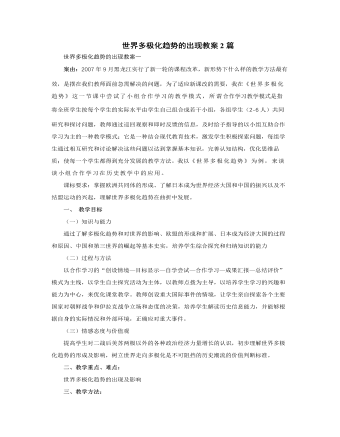
人教版高中历史必修1世界多极化趋势的出现教案2篇
一、 教学目标 (一)知识与能力通过了解多极化趋势和对世界的影响、欧盟的形成和扩展、日本成为经济大国的过程和原因、中国和第三世界的崛起等基本史实,培养学生综合探究和归纳知识的能力(二)过程与方法以合作学习的“创设情境—目标显示—自学尝试—合作学习—成果汇报—总结评价”模式为主线,以学生自主探究活动为主体,以教师点拨为主导,以培养学生学习的兴趣和能力为中心,来优化课堂教学。教师创设重大国际事件的情境,让学生亲自探索各个主要国家对朝鲜战争和伊拉克战争立场和态度的决策,培养学生解读历史信息能力,并能够根据自身的实际情况和外部环境,正确应对重大事件。 (三)情感态度与价值观提高学生对二战后美苏两极以外的各种政治经济力量增长的认识,初步理解世界多极化趋势的形成及影响,树立世界走向多极化是不可阻挡的历史潮流的价值判断标准。
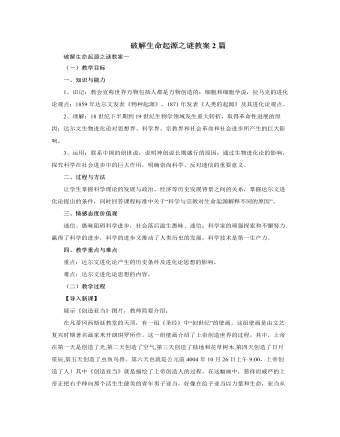
人教版高中历史必修3破解生命起源之谜教案2篇
设问:你怎么看待这个问题的?(这是达尔文没有想到的,是有人利用了达尔文的学说,科学应该与其区分开来,但是科学家在研究时,既要做到为追求真理不断探索,又要有一定的人文精神,比如我们只有以人为本,才能找到解决当今社会面临的诸如环保、战争、饥荒等问题的途径,才能构建防止核物理技术、克隆技术、信息技术、生物技术、太空技术等可能对人类造成不可逆转的破坏作用的思想基础、决策机制和社会条件。更重要的是社会和国家应该对此有足够的认识,正因为此,所以现在当一项科学发明出台后,就会有一些法律出台,限制其可能的非人道用途。但是这些影响应不成为我们进行科学探究的阻碍。)(3)科学与宗教的斗争设计意图:再次引导学生认识,科学的探索永无止境,同时也再次认识宗教和科学理论产生的原因。材料1:1972年,美国加利福尼亚教育部竟明文规定,中学生物学课本除进化论外,必须还有神创论的内容,而且两者的页数要各占一半。
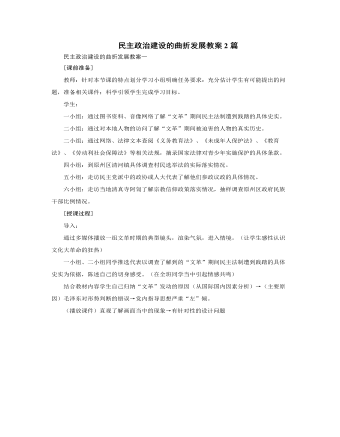
人教版高中历史必修1民主政治建设的曲折发展教案2篇
3.法律制度走向健全关于法律制度走向健全的历史条件,可指导学生阅读教材相关段落,教师适当补充说明,得出结论:提出法制建设方针并着手平反冤假错案,这是恢复和加强民主法制建设的重要举措。为全面开展法制建设准备了政治基础。关于法制建设方针的提出,可由教师补充材料,使学生理解加强法制建设的必要性,如:邓小平会见意大利记者奥琳埃娜?法拉奇(1980年8月)“奥:我看不出怎样才能避免或防止再发生诸如“文化大革命”这样可怕的事情。”“邓:这要从制度方面解决问题。我们过去的一些制度,实际上受了封建主义的影响,包括个人迷信、家长制或家长作风,甚至包括干部职务终身制。我们现在正在研究避免重复这种现象,准备从改革制度着手。我们这个国家有几千年封建社会的历史,缺乏社会主义的民主和社会主义的法制。现在我们要认真建立社会主义的民主制度和社会主义法制。只有这样,才能解决问题。”
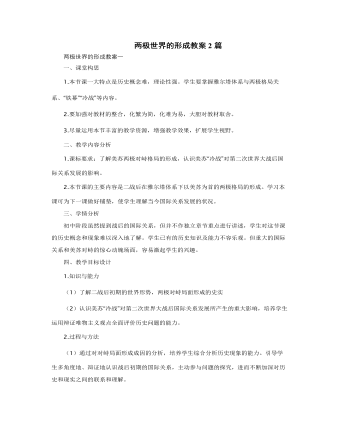
人教版高中历史必修1两极世界的形成教案2篇
这三大措施是美国在冷战初期的核心内容,是为了实现美国的霸权政策而提出。它们体现了美国充分利用了意识形态差异的来其实现其全球霸权的意图。把握住这些核心内容将有助于掌握二战后的国际形势的发展。教学难点:两极格局对二战后国际关系发展的影响二战改变国际的主要政治力量,随着国家利益和意识形态冲突,美苏两大国由合作走向分裂,逐步形成了战后的两极格局。在此政治格局之下,避免了新的世界大战爆发,世界相对稳定,但两强相争,又使得世界长期不得安宁。美苏之间的关系影响到了其他各种关系的发展,认清此格局的影响对于认识当时和今天的国际关系具有重大的意义。三、教学内容安排(1学时)第一目“从盟友到对手”教学要点:雅尔塔体系的确立;战后初期的形势;杜鲁门主义的提出。第二目“美苏‘冷战’”教学要点:马歇尔计划与经济互助委员会;北约与华约两大军事政治集团的对峙。第三目“‘冷战’阴影下的国际关系”
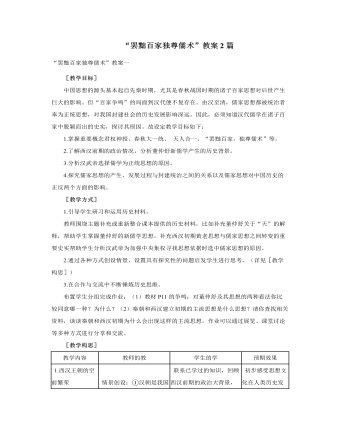
人教版高中历史必修3“罢黜百家独尊儒术”教案2篇
战国阴阳五行家邹衍认为,历史中的朝代更替是由于五德运行产生的影响。按照邹衍的学说,每个朝代必须与五德之一相连,因此,这个朝代就应当遵循这五德之一的要求来运转。董仲舒修改了这个理论,认为朝代的更替不是依循五德运行的顺序,而是依循“三统”,即黑统、白统、赤统的顺序。他在《三代改制质文》中说:每个朝代都依循一统,每统又各有其为政的系统。按董仲舒的说法,夏朝代表黑统,商朝代表白统;周朝则是赤统。夏、商、周三朝完成了这一历史循环。之后,历史又开始一次新的循环,新的朝代又应当代表黑统。继承周朝统治的既不是秦朝,也不是汉朝,而是孔子,他承受天命,创立了黑统。孔子所受天命,不是一种“法统”,而是一种“道统”。董仲舒说:“《春秋》大一统者,天地之常经,古今之通谊也。今师异道,人异论,百家殊方,指意不同,是以上亡以持一统;法制数变,下不知所守。臣愚以为诸不在六艺之科孔子之术者,皆绝其道,勿使并进。邪辟之说灭息,然后统纪可一而法度可明,民知所从矣。”
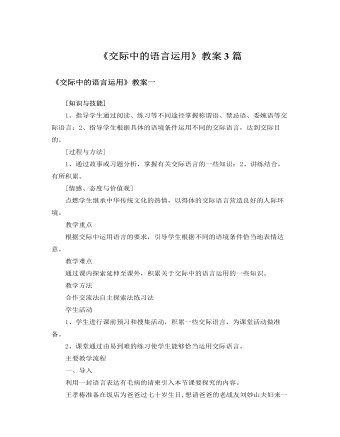
人教版高中语文必修3《交际中的语言运用》教案3篇
知识与技能1、指导学生初步掌握称谓语、禁忌语、委婉语等交际语言;2、指导学生根据具体的语境条件运用不同的交际语言,达到交际目的。过程与方法1、通过故事或习题分析,掌握有关交际语言的一些知识;2、讲练结合,有所积累。情感、态度与价值观点燃学生继承中华传统文化的热情,以得体的交际语言营造良好的人际环境。教学重点根据交际中运用语言的要求,引导学生根据不同的语境条件恰当地表情达意。教学难点通过课内探索延伸至课外,积累关于交际中的语言运用的一些知识。教学课时:一课时教学过程一、导入利用一道口语交际训练题引入本节课要探究的内容。例1:下面的场合,如果班长既想达到批评的目的,又想把话说得委婉些,表达恰当的一项是(C)小李和小杨,为了一点小事,两人自习课上大声地争吵起来。这时,班长说:A、你们这样大声争吵,影响很坏。B、你们这样大声争吵,难道不感到羞耻吧?
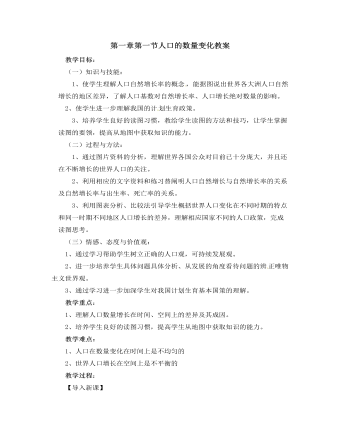
人教版新课标高中地理必修2第一章第一节人口的数量变化教案
材料四:印度提倡“只生一个好”——鼓励三人小家庭 生男生女都一样材料五:印度尼西亚《人口发展与幸福家庭法》材料六:我国基本国策 计划生育(小结)通过对以上材料的分析我们可以得出这样的结论,不同的国家应该采取不同的人口政策,对与发达国家来说人口增长缓慢,应采取鼓励生育,吸引移民的措施;发展中国家人口增长较快,实行控制人口的政策已经迫在眉睫。不论是发达国家还是发展中国家共同的目标就是实现环境人口和社会经济的协调发展。【课堂小结】这节课我们主要学习了人口的自然增长,影响人口自然增长的因素有哪些?(人口的自然增长率和人口的基数)世界人口的数量在不同的历史时期表现出不同的特征,同一历史时期的不同地区,人口数量的增长又有不同的特点。面对不同的人口形势,各国应采取不同的人口政策。
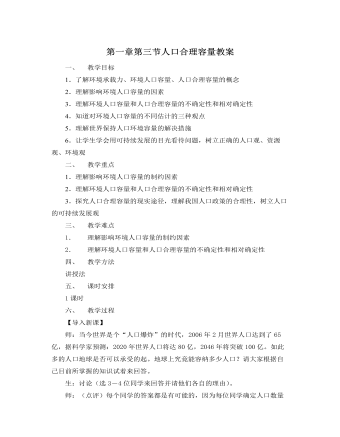
人教版新课标高中地理必修2第一章第三节人口合理容量教案
生:环境承载力是指环境能持续供养的人口数量。师:对了。但是有同学仍然会感到这是一个很抽象的概念。下面我们具体来了解什么是环境承载力。我们可以从两个部分去理解:一、环境,它主要是指环境的单个要素(如:土地、水、气候、植被等。)及其组合方式。二、是承载力,它指在特定的条件下,具体某事物能承受的某种活动的最大值。那环境承载力的科学定义是怎样表达的呢?生:环境承载力是指某一时期,某种状态条件下,某地区环境所能承受的人类活动作用的阈值。师:很对。 我们可以用一个生动的例子来说明。一只木桶里面的水的多少在底面积固定不变的情况下是由哪块木板来决定?生:最短的那块。师:确实如此。这就是我们平常所讲的 “木桶效应”。那影响环境承载力的大小也是由环境个要素里面最紧缺的那个要素来决定的。下面我们用一个例子来印证一下。





















